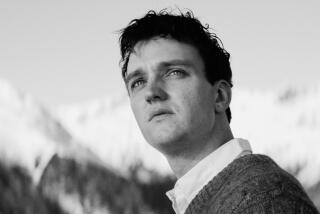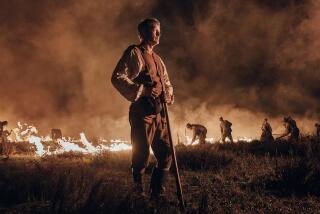The time for self-creation
- Share via
For all their emphasis on the youth market, American movies have never done a good job of portraying actual youth. The idea that young equals dumb prevails -- never mind that it’s about the only time in life when reading Foucault or sitting through a Tarkovsky double feature is a viable task. What Hollywood tends to ignore is perhaps the central project of late adolescence and early adulthood -- the avid, voracious creation of identity through books, movies, music and cultural hero-worship.
Norwegian director Joachim Trier’s inspiring first feature “Reprise” joyfully tackles the process of self-creation, as well as the friendships that feed and sustain it. He captures, in a way that’s cool and romantic and heady, the moment in life when nothing matters more than ideas, influences and the possibility of shaping one’s life into a work of art.
“Reprise” is the story of Phillip (Anders Danielsen Lie) and Erik (Espen Klouman-Hoiner), two friends who finish writing their first novels and mail them off together from the same mailbox. In their shared fantasy, which Trier tells in an artful, narrated fast-forward catapulting fashion, both books get accepted for publication. Low sales and cult authorship follow, along with tragic romances and moody trips to Paris. Then an accidental reunion, a cowritten project that sets off revolutions in faraway countries and draws the ire of religious leaders, a changed world.
Of course, none of this happens, at least not in the way Phillip and Erik imagine. Phillip’s book gets published and Erik’s does not, but it is Erik who survives this particular calamity. Phillip’s sudden minor celebrity triggers a psychotic episode and, within six months, their world looks very different from the one they had imagined.
“Reprise,” whose title is a play, I suppose, on the tendency in youth to play life out in the imagination as it plays itself out at a snail’s pace in real life, uses things like possibility and projection into the future in the same way other films experiment with time. Unrealized potential plays a major part in the story, which is both propelled and haunted by what could have been, might have been, should have been, wasn’t.
Erik and Phillip are part of a larger group of friends whose dependence on one another is equaled only by their competitiveness with one another. Girlfriends also constitute a major threat to their insecure insularity. Erik keeps Lillian (Silje Hagen) at arms length for as long as he can, never involving her in any activity that will also involve his friends. Phillip’s girlfriend Kari (Viktoria Winge) is partially blamed for Phillip’s breakdown. (The narrator calls the relationship “obsessive,” although there’s no real evidence on-screen that it is.) The only person Erik truly pines for is his literary hero, the “reclusive author” Sten Egil Dahl.
Erik’s novel, which he eventually publishes, is called “Prosopopeia,” a term from Greek drama that can mean several things: a face, mask or dramatic character; a figure of speech in which an absent or imaginary person is represented as speaking; or the personification of an abstraction.
All three definitions apply to Trier’s film (it’s never clear what Erik’s novel is about, except that it deals symbolically -- though perhaps not as symbolically as he would have liked, as evidenced by a disastrous TV appearance -- with madness), but the last definition may apply the most. Erik, Phillip and their friends spend their time and expend their imagination trying to personify abstractions, elusive ideals. It’s pointless, perhaps, but they still have time to burn.
--
--
“Reprise.” MPAA rating: R for sexuality and language. Running time: 1 hour and 45 minutes. In limited release.
More to Read
Only good movies
Get the Indie Focus newsletter, Mark Olsen's weekly guide to the world of cinema.
You may occasionally receive promotional content from the Los Angeles Times.










